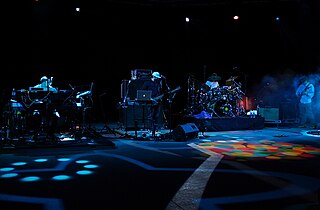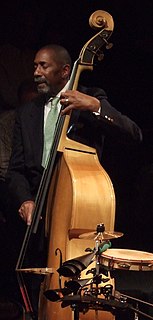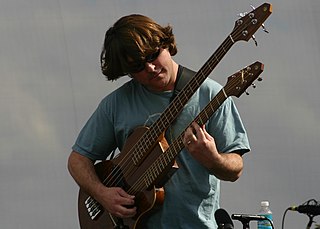
A drum set – also called a drum kit, trap set or simply drums – is a collection of drums, cymbals and other percussion instruments, which are set up on stands to be played by a single player, with drumsticks held in both hands and the feet operating pedals that control the hi-hat cymbal and the beater for the bass drum. A drum kit consists of a mix of drums and idiophones – most significantly cymbals, but can also include the woodblock and cowbell. In the 2020s, some kits also include electronic instruments. Also, both hybrid and entirely electronic kits are used.

The term jazz guitar may refer to either a type of electric guitar or to the variety of guitar playing styles used in the various genres which are commonly termed "jazz". The jazz-type guitar was born as a result of using electric amplification to increase the volume of conventional acoustic guitars.

A musical ensemble, also known as a music group or musical group, is a group of people who perform instrumental or vocal music, with the ensemble typically known by a distinct name. Some music ensembles consist solely of instruments, such as the jazz quartet or the orchestra. Other music ensembles consist solely of singers, such as choirs and doo wop groups. In both popular music and classical music, there are ensembles in which both instrumentalists and singers perform, such as the rock band or the Baroque chamber group for basso continuo and one or more singers. In classical music, trios or quartets either blend the sounds of musical instrument families or group together instruments from the same instrument family, such as string ensembles or wind ensembles. Some ensembles blend the sounds of a variety of instrument families, such as the orchestra, which uses a string section, brass instruments, woodwinds and percussion instruments, or the concert band, which uses brass, woodwinds and percussion.
In electroacoustic pop, rock, and other kinds of music, a loop is a repeating section of sound material. Short sections of material can be repeated to create ostinato patterns. Longer sections can also be repeated: for example, a player might loop what they play on an entire verse of a song in order to then play along with it, accompanying himself.

Osbourne Ruddock, better known as King Tubby, was a Jamaican sound engineer who greatly influenced the development of dub in the 1960s and 1970s.
"Echoes" is a song by English rock band Pink Floyd, and the sixth and final track from their 1971 album Meddle. It was written in 1970 by all four members of the group. Containing several extended instrumental passages, ambient sound effects, and musical improvisation, "Echoes" has a running time of 23:31 and comprises the entire second side of the vinyl and cassette recordings. It was assembled from separate fragments. It was later split in two parts to serve as both the opening and closing numbers in the band's film Live at Pompeii.
Lead guitar, also known as solo guitar, is a musical part for a guitar in which the guitarist plays melody lines, instrumental fill passages, guitar solos, and occasionally, some riffs within a song structure. The lead is the featured guitar, which usually plays single-note-based lines or double-stops. In rock, heavy metal, blues, jazz, punk, fusion, some pop, and other music styles, lead guitar lines are usually supported by a second guitarist who plays rhythm guitar, which consists of accompaniment chords and riffs.

A guitar solo is a melodic passage, instrumental section, or entire piece of music written for a classical guitar, electric guitar or an acoustic guitar. In 20th and 21st century traditional music and popular music such as blues, swing, jazz, jazz fusion, rock and metal, guitar solos often contain virtuoso techniques and varying degrees of improvisation. Guitar solos on classical guitar, which are typically written in musical notation, are also used in classical music forms such as chamber music and concertos.

A rhythm section is a group of musicians within a music ensemble or band that provides the underlying rhythm, harmony and pulse of the accompaniment, providing a rhythmic and harmonic reference and "beat" for the rest of the band. The rhythm section is often contrasted with the roles of other musicians in the band, such as the lead guitarist or lead vocals whose primary job is to carry the melody.

The Disco Biscuits are a jam band from Philadelphia, Pennsylvania. The band consists of Allen Aucoin (drums), Marc "Brownie" Brownstein, Jon "The Barber" Gutwillig, and Aron Magner. The band incorporates elements from a variety of musical genres with a base of electronic and rock. Their style has been described as trance fusion.

Jazz bass is the use of the double bass or bass guitar to improvise accompaniment ("comping") basslines and solos in a jazz or jazz fusion style. Players began using the double bass in jazz in the 1890s to supply the low-pitched walking basslines that outlined the chord progressions of the songs. From the 1920s and 1930s Swing and big band era, through 1940s Bebop and 1950s Hard Bop, to the 1960s-era "free jazz" movement, the resonant, woody sound of the double bass anchored everything from small jazz combos to large jazz big bands.

Jimmy Herring is the lead guitarist for the band Widespread Panic. He is a founding member of Aquarium Rescue Unit and Jazz Is Dead and has played with The Allman Brothers Band, Project Z, Derek Trucks Band, Phil Lesh and Friends, and The Dead.

Keller Williams is an American singer, songwriter and musician who combines elements of bluegrass, folk, alternative rock, reggae, electronica/dance, jazz, funk, along with other assorted genres. He is often described as a 'one-man jam-band' due to his frequent use of live phrase looping with multiple instruments. Keller Williams was born in Fredericksburg, Virginia on February 4, 1970 and began playing the guitar in his early teens. He later matriculated to Virginia Wesleyan College in Virginia Beach where he received his degree in theater. After college, he moved to Colorado to advance his music career and expand his repertoire.

"Run Like Hell" is a song by the English progressive rock band Pink Floyd, written by David Gilmour and Roger Waters. It appears on the album The Wall. It was released as a single in 1980, reaching #15 in the Canadian singles chart as well as #18 in Sweden, but only reached #53 in the U.S. A 12" single of "Run Like Hell," "Don't Leave Me Now" and "Another Brick in the Wall " peaked at #57 on the Disco Top 100 chart in the U.S. To date, it is the last original composition written by both Gilmour and Waters, the last of such under the Pink Floyd banner, and is the last composition ever recorded by all four members of the classic 70s-era Floyd lineup together, within their traditional instrumental roles of Waters on bass, Gilmour on guitars, Nick Mason on drums, and Richard Wright on keyboards, on the same song.
Growing is a drone music/ambient music/noise music band formed in Olympia, Washington, and currently based in Brooklyn, New York. The group was founded in 2001 by Kevin Doria, Joe Denardo, and Zack Carlson (drums). Carlson left following their first album, and the band continued as a duo until 2009, when they recruited Sadie Laska to form a new trio. The group's music has gradually progressed from slow, instrumental drone pieces through works in noise and ambient music toward more propulsive, rhythm driven music. Their live shows are consistently known for being very loud and for playing straight through their set without breaks or banter between songs.

Live looping is the recording and playback of a piece of music in real-time using either dedicated hardware devices, called loopers or phrase samplers, or software running on a computer with an audio interface. Musicians can loop with either laptop software or loop pedals, which are sold for tabletop and floor-based use.

Delay is an audio signal processing technique that records an input signal to a storage medium and then plays it back after a period of time. When the wet (processed) audio is blended with the dry (unprocessed) audio, it creates an echo-like effect, whereby the original audio is heard followed by the delayed audio. The delayed signal may be played back multiple times, or fed back into the recording, to create the sound of a repeating, decaying echo.
"Embryo" is a song by Pink Floyd. It was a concert staple in 1970–71, but a full band version was never released on any Pink Floyd studio album. A studio version did appear in 1970 on the rare multi-artist album Picnic – A Breath of Fresh Air. Its next appearance was in 1983 on Pink Floyd's own compilation Works. It then appeared in 2007 on A Breath of Fresh Air – A Harvest Records Anthology 1969–1974. Multiple renditions of "Embryo" appeared on the band's 2016 box set The Early Years 1965–1972; two versions were also included on the smaller 2-disc compilation The Early Years 1967–1972: Cre/ation (2016).
Robin Simon is a British guitarist who was a member of Ultravox, Magazine and Visage.

This is a list of jazz and popular music terms that are likely to be encountered in printed popular music songbooks, fake books and vocal scores, big band scores, jazz, and rock concert reviews, and album liner notes. This glossary includes terms for musical instruments, playing or singing techniques, amplifiers, effects units, sound reinforcement equipment, and recording gear and techniques which are widely used in jazz and popular music. Most of the terms are in English, but in some cases, terms from other languages are encountered.













